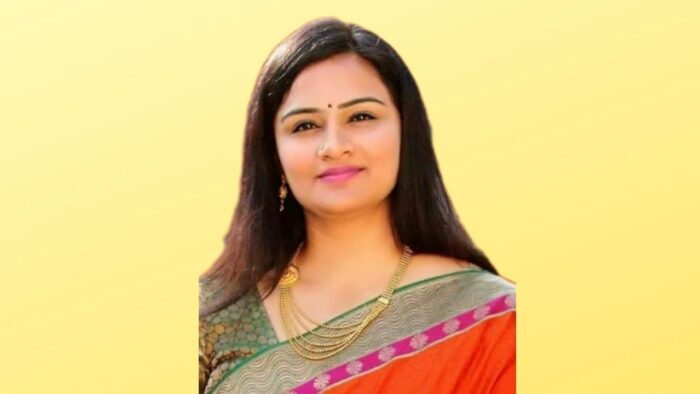Dr Lalitha Gaurav pursued a post doctoral programme in Yoga from the ICSSR (Indian Council of Social Science Research) and she has a Doctorate in Yogic Sciences. She is a NET qualified professional with 15 years of experience in research, teaching and instructing yoga as well as imparting knowledge on yogic scriptures, yoga therapeutic prescriptions and yoga teaching practices. She has also authored two books, and is the co-founder of Vinyas Yoga Studio, a yoga therapy centre functioning in Gwalior for the past 13 years. Dr Lalitha’s approach to teaching doesn’t just add value to her student’s lives, it transforms them and gives them purpose to improve society as well. She’s worked with prison inmates and studied the effects of yoga on inner personality development and transformation, and feels that yoga should be practised in its entirety for it to be truly effective. I spoke to her about her personal yoga journey, the guru-shishya parampara and how yoga can help us transform and create positive change. Read on for excerpts from our conversation…
Guru-Shishya Parampara…
Dr Lalitha: My yoga journey is influenced by my guru Dr R. Ranganji — he holds a PhD in yoga from the S-VYASA university, and I was exposed to the university through him. I have been interested in the teachings of Valmiki’s Ramayana, yoga and vedic practices and the Upanishads since I was in college and the Ramayana inspired me to study further. I joined the S-VYASA university and that is where my story of yoga began. Growing up, I was familiar with Bhakti yoga through my grandparents but I discovered the philosophy or jñāna yoga at S-VYASA university…
The Accessibility of Yoga…
Dr Lalitha: Right from my master’s degree, I had this special inclination towards the Upanishads and the realisation of the Self. I’m deeply influenced by Bhagvan Ramana Maharshi’s teachings and I wanted to share that knowledge with even house-holders but in a way that they can relate to it and apply it. For example, a householder is not worried about things like spiritual essence or uniting the gross body with the subtle. They’re more concerned about the health issues that come with hectic lifestyles like stress, anxiety, diabetes… So to teach a householder what self-actualisation is a great task (laughs)...It’s as Swami Vivekananda once said, “you can’t teach spirituality to hungry people. You have to feed them first.” So as a yoga teacher, I was drawn to yoga as therapy because I wanted to find a way to use yoga for all these stress-related lifestyle problems.
After my master’s I treated a few patients with yoga and I was overwhelmed with the positive response on how effective the practice was for lifestyle problems. So it’s been a slow process but I knew this is what I wanted to do and when I married Gauravji and moved to Gwalior, I set up the Vinyas Yoga Studio and it’s been 13 years since.
The Importance of Yoga Philosophy…
Dr Lalitha: I do feel it is essential for a spiritual practitioner. I’ll share the experience of a person I met virtually some time ago. This person was a dedicated student but followed some self-proclaimed yoga master in Romania and claimed that she was taught how to open and close her chakras when she wakes up and falls asleep every day. I was shocked to hear this. I feel this kind of superstition and false practice happens due to lack of correct knowledge both practical and theoretical. I spoke to the student and counselled her to understand that you need to seek the true base of knowledge and understand the science and logic of yogic practices and that comes from philosophy. It’s important to bring philosophical knowledge into the practice so we don’t end up believing things like we can open or close our chakras on a daily basis. I feel all the streams of yoga should be practised — karma, bhakti, jñāna, raja.
Surrender to the Divine…
Dr Lalitha: I feel one of the best ways to tackle stress is to surrender to the divine. We are stressed and panic because we always want an outcome. We are in activity to achieve an outcome. It is in our nature to act in order to achieve and when we keep doing this, we will panic and feel stressed when we don’t always get the outcome that we expect. But when we act in surrender to the divine, we become mere agents of even our actions. When we act without expectation, everything we do becomes divine and what we receive becomes prasadam regardless of whether or not it is the outcome we want. For example, when we go to a temple, and we get prasadam, it’s always a small quantity and regardless of how delicious it is, we don’t ask for more and respect what we receive. That same principle can be applied to life. Take everything that you receive as prasadam. I also recommend japa. It is very calming and relaxing. Discontent is the root cause of stress and if we can break this cycle of discontent, there will be no discontent, and therefore, no stress. Yoga and spirituality give us the tools to find contentment.
The Transformative Nature of Yoga…
Dr Lalitha: My husband has been a Vivekananda Kendra worker for a very long time and I also have a similar path in terms of respect for social service. We decided to work with prison inmates to see the effects of yoga on inner personality transformation and development. To start with we worked with 85 inmates and offered them a six-month yoga course. They were taught practical and theory sessions where I used my learning at the S-VYASA university to offer a similar opportunity to these inmates. They were offered everything from bhajans, chanting, the foundation of yoga principles and practice. We then also equipped them to teach what we taught them so they can derive a sense of purpose. These inmates then started visiting other jails as instructors to share what they learned; transforming and creating change. We monitored the progress of the inmates who were practising yoga and within one month, their aural scans improved. Within three months, they were dealing better with anger issues, and in six months, when I measured all their psychological traits like emotional maturity or emotional intelligence, I saw an improvement in everything. There was a psychological transformation.
Advice to Young Yoga Students and Aspiring Teachers…
Dr Lalitha: Naidanyata and Vistarata (slowness and expansiveness). Whatever you teach, at the end of your class, your students have to feel relaxed, in tune with their mind and slow in terms of thoughts. If you can slow down their thoughts, then that is an effective yoga therapy programme.
For further information of Dr Lalitha’s work visit, Vinyas Yoga Studio.





